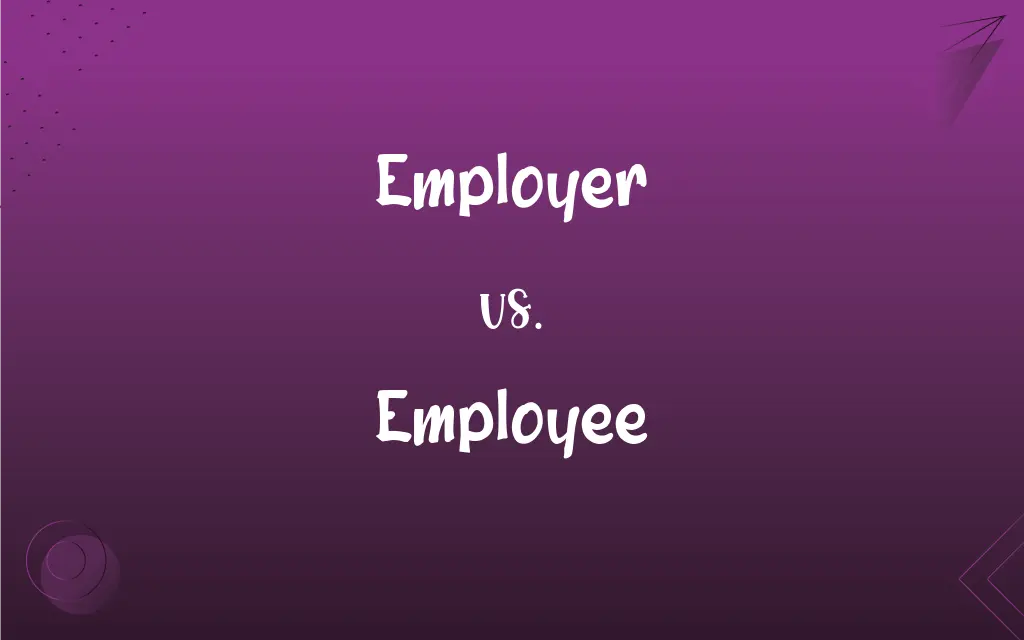Employer vs. Employee: What's the Difference?
Edited by Harlon Moss || By Janet White || Updated on September 18, 2023
An "Employer" is an individual or organization that hires and pays for labor, while an "Employee" is an individual who is hired to provide services to an employer in exchange for compensation.

Key Differences
An "Employer" is the party that hires workers to perform specific tasks, usually in exchange for wages or salary. They have the authority to make decisions, set rules, and manage the business. The "Employee," on the other hand, is the individual who performs tasks under the direction of the employer.
Both "Employer" and "Employee" serve different roles within the professional environment. The employer offers jobs, while the employee accepts the job and delivers the agreed-upon services. The responsibilities and privileges of each are legally defined to protect both parties.
While the word "Employer" typically conveys a sense of authority or control, the term "Employee" implies a role of subservience or obligation to perform duties as assigned. However, in some professional settings, the power dynamics can be more nuanced.
The term "Employer" is often associated with organizational management skills like leadership, decision-making, and the ability to hire or fire staff. "Employee," conversely, is often linked with skill sets related to the job at hand, commitment, and performance.
Comparison Chart
Part of Speech
Noun
Noun
ADVERTISEMENT
Role
Hiring entity
Hired individual
Authority
High
Lower
Legal Obligations
Provide compensation
Perform tasks
Related Terms
Boss, Owner
Worker, Staff
Employer and Employee Definitions
Employer
An individual or entity that hires workers.
The employer posted a job opening.
ADVERTISEMENT
Employee
An individual hired to provide services.
The employee clocked in at 9 AM.
Employer
An organization offering job opportunities.
That tech company is a prominent employer in the area.
Employee
A staff member of an organization.
The employee attended the weekly meeting.
Employer
A role focused on management and decision-making.
As an employer, she had to make tough choices.
Employee
A role performing specific tasks for wages.
As an employee, she focused on customer service.
Employer
The party legally accountable for workplace conditions.
The employer ensured a safe working environment.
Employee
A worker receiving compensation.
The employee received his paycheck.
Employer
To provide work to (someone) for pay
Agreed to employ the job applicant.
Employee
A person under an employment contract.
The employee had a one-year contract.
Employer
To engage the attention or activity of; occupy
Employed himself for an hour reading blogs.
Employee
A person who works for another in return for financial or other compensation.
Employer
To put (something) to use or service
Employed a pen to open the package.
Employed her skills in the new job.
Employee
An individual who provides labor to a company or another person.
One way to encourage your employees to work harder is by giving them incentives.
Employer
To devote (time, for example) to an activity or purpose
Employed several months in learning Swahili.
Employee
One employed by another.
Employer
The state of being employed
In the employ of the city.
Employee
A worker who is hired to perform a job
Employer
(Archaic) An occupation.
Employer
A person, firm or other entity which pays for or hires the services of another person.
Employer
One who employs another; as, an employer of workmen.
Employer
A person or firm that employs workers
Employer
A person responsible for paying salaries.
The employer issued paychecks on Friday.
FAQs
What is an Employer?
An employer is an individual or entity that hires and pays for labor.
What are the Employer's responsibilities?
Employers are responsible for providing a safe work environment and compensation.
Is an Employee always paid?
Generally, employees are paid, but some cases like internships may not involve payment.
Can an Employer also be an Employee?
Yes, someone can be both an employer and an employee depending on the context.
What is an Employee?
An employee is an individual hired by an employer to perform tasks in exchange for pay.
Is Employer a legal term?
Yes, "employer" has specific legal implications regarding responsibilities and rights.
How does an Employer benefit a business?
Employers make key decisions that drive business goals and growth.
How does an Employee benefit a business?
Employees execute tasks and roles that contribute to the business's operations and goals.
What are the Employee's responsibilities?
Employees must fulfill the tasks and obligations outlined in their employment contract.
Is Employee a legal term?
Yes, "employee" is legally defined and comes with specific rights and obligations.
Can an Employer fire an Employee for any reason?
Depending on jurisdiction and contract, there may be limits on termination reasons.
Can an Employee quit at any time?
Generally, unless bound by contract terms, an employee can resign.
What types of Employers exist?
Employers can be individuals, corporations, nonprofits, or government entities.
What types of Employees exist?
Employees can be full-time, part-time, contract-based, or temporary.
How are Employers and Employees bound legally?
Usually through an employment contract that outlines rights, responsibilities, and terms.
About Author
Written by
Janet WhiteJanet White has been an esteemed writer and blogger for Difference Wiki. Holding a Master's degree in Science and Medical Journalism from the prestigious Boston University, she has consistently demonstrated her expertise and passion for her field. When she's not immersed in her work, Janet relishes her time exercising, delving into a good book, and cherishing moments with friends and family.
Edited by
Harlon MossHarlon is a seasoned quality moderator and accomplished content writer for Difference Wiki. An alumnus of the prestigious University of California, he earned his degree in Computer Science. Leveraging his academic background, Harlon brings a meticulous and informed perspective to his work, ensuring content accuracy and excellence.































































